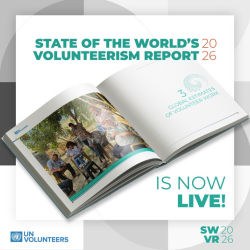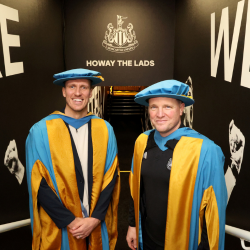-
Study
-
Quick Links
- Open Days & Events
- Real-World Learning
- Unlock Your Potential
- Tuition Fees, Funding & Scholarships
- Real World Learning
-
Undergraduate
- Application Guides
- UCAS Exhibitions
- Extended Degrees
- School & College Outreach
- Information for Parents
-
Postgraduate
- Application Guide
- Postgraduate Research Degrees
- Flexible Learning
- Change Direction
- Register your Interest
-
Student Life
- Students' Union
- The Hub - Student Blog
- Accommodation
- Northumbria Sport
- Support for Students
-
Learning Experience
- Real-World Learning
- Research-enriched learning
- Graduate Futures
- The Business Clinic
- Study Abroad
-
-
International
International
Northumbria’s global footprint touches every continent across the world, through our global partnerships across 17 institutions in 10 countries, to our 277,000 strong alumni community and 150 recruitment partners – we prepare our students for the challenges of tomorrow. Discover more about how to join Northumbria’s global family or our partnerships.
View our Global Footprint-
Quick Links
- Course Search
- Undergraduate Study
- Postgraduate Study
- Information for Parents
- London Campus
- Northumbria Pathway
- Cost of Living
- Sign up for Information
-
International Students
- Information for International Students
- Northumbria and your Country
- International Events
- Application Guide
- Entry Requirements and Education Country Agents
- Global Offices
- English Requirements
- English Language Centre
- International student support
- Cost of Living
-
International Fees and Funding
- International Undergraduate Fees
- International Undergraduate Funding
- International Masters Fees
- International Masters Funding
- International Postgraduate Research Fees
- International Postgraduate Research Funding
- Useful Financial Information
-
International Partners
- Agent and Representatives Network
- Global Partnerships
- Global Community
-
International Mobility
- Study Abroad
- Information for Incoming Exchange Students
-
-
Business
Business
The world is changing faster than ever before. The future is there to be won by organisations who find ways to turn today's possibilities into tomorrows competitive edge. In a connected world, collaboration can be the key to success.
More on our Business Services-
Business Quick Links
- Contact Us
- Business Events
- Research and Consultancy
- Education and Training
- Workforce Development Courses
- Join our mailing list
-
Education and Training
- Higher and Degree Apprenticeships
- Continuing Professional Development
- Apprenticeship Fees & Funding
- Apprenticeship FAQs
- How to Develop an Apprentice
- Apprenticeship Vacancies
- Enquire Now
-
Research and Consultancy
- Space
- Energy
- AI and Tech
- CHASE: Centre for Health and Social Equity
- NESST
-
-
Research
Research
Northumbria is a research-rich, business-focused, professional university with a global reputation for academic quality. We conduct ground-breaking research that is responsive to the science & technology, health & well being, economic and social and arts & cultural needs for the communities
Discover more about our Research-
Quick Links
- Research Peaks of Excellence
- Academic Departments
- Research Staff
- Postgraduate Research Studentships
- Research Events
-
Research at Northumbria
- Interdisciplinary Research Themes
- Research Impact
- REF
- Partners and Collaborators
-
Support for Researchers
- Research and Innovation Services Staff
- Researcher Development and Training
- Ethics, Integrity, and Trusted Research
- University Library
- Vice Chancellors Fellows
-
Research Degrees
- Postgraduate Research Overview
- Doctoral Training Partnerships and Centres
- Academic Departments
-
Research Culture
- Research Culture
- Research Culture Action Plan
- Concordats and Commitments
-
-
About Us
-
About Northumbria
- Our Strategy
- Our Staff
- Our Schools
- Place and Partnerships
- Leadership & Governance
- University Services
- Northumbria History
- Contact us
- Online Shop
-
-
Alumni
Alumni
Northumbria University is renowned for the calibre of its business-ready graduates. Our alumni network has over 250,000 graduates based in 178 countries worldwide in a range of sectors, our alumni are making a real impact on the world.
Our Alumni - Work For Us
What will I learn on this module?
This module aims to evolve your practice and set new direction by consolidating your knowledge gained in earlier modules. It offers you the opportunity to engage in a self-initiated and self-directed research-led project that evidences a critical, creative and impactful approach to communication design.
You will learn to draw on skills, knowledge and experience developed in the previous modules to frame and contextualise a social, environmental, cultural or political issue that you are passionate about. You will use this to develop a creative brief that allows for compelling and thought-provoking explorations using communication design in response. You will learn how to articulate, frame, ethically evaluate and communicate your proposition in a clear, relevant and compelling way for the appropriate audience. You will learn to draw on your collaborative skills to engage with and work with your chosen stakeholders in close collaboration to realise your self-initiated project.
Alongside a fully realised communication design outcomes, you will also produce an annotated portfolio documenting your design process. These outputs will be supplemented with a project evaluation report that communicates the context of the investigation, the design criteria, the evaluation methods and learnings from the development and delivery of your final project.
How will I learn on this module?
You will be expected to develop and realise your final project through self-directed learning supported by individual tutorials, peer learning, group critiques, invited lectures and presentations.
How will I be supported academically on this module?
You will be assigned a personal tutor matched to your subject focus and supported through online and live in-class sessions.
Further academic support is provided via e-Learning tools, such as online discussion groups, blogs and wikis. Additional contact with tutors may be available during office hours by arrangement.
Additional support is provided through the English for Specific Academic Purposes (ESAP) module where English is not your first language.
What will I be expected to read on this module?
All modules at Northumbria include a range of reading materials that students are expected to engage with. The reading list for this module can be found at: http://readinglists.northumbria.ac.uk
(Reading List service online guide for academic staff this containing contact details for the Reading List team – http://library.northumbria.ac.uk/readinglists)
What will I be expected to achieve?
Knowledge & Understanding:
• Critically reflect and apply theoretical knowledge of communication design and evaluate contemporary discourse on the subject through your practical and written outcomes.
• Contribute to the creation of new knowledge and/or applications to practice.
Intellectual / Professional skills & abilities:
• Generate ideas, interventions or proposals that are creative, challenging, ethical, and impactful.
• Organise, plan and undertake project research and development in an analytical and evaluative manner.
• Create clear and compelling outcomes that communicate and present design development and creative outcomes to specialist and non-specialist audiences.
Personal Values Attributes (Global / Cultural awareness, Ethics, Curiosity) (PVA):
• Articulate your unique contribution in context supporting your future employability and long-term career prospects.
• Show professionalism, self-management and leadership throughout the module and when working in dialogue with experts and stakeholders.
• Critically reflect and evaluate on your personal development and design outcomes. Evidence responses for improvement.
How will I be assessed?
This module will be 100% summatively assessed at the end of the module through a portfolio submission and a critical reflection or project evaluation report. Where possible, it will be digital submission through the eLearning Portal.
1. Portfolio Submission:
a. Final major project presentation
b. A working prototype or demonstration of your design proposition.
c. An annotated portfolio and media kit of visual evidence documenting the research, development, realisation and evaluation of the final design piece. Approximate 60 pages or equivalent subject to negotiation with the module tutor.
2. A project evaluation report of between 4500–5000 words that covers the following: context of the area of investigation, design criteria, evaluation methods and learnings from the development and delivery of your final project.
Pre-requisite(s)
N/A
Co-requisite(s)
N/A
Module abstract
This module is dedicated to evolving and expanding your practice through the creation of your Final Major Project. It is the culmination of your Masters journey leading to a highly personal self-initiated issue-driven project that evidences a critical, responsible and impactful approach to communication design.
You will draw on skills, knowledge and experience developed in the previous modules to turn your initial design proposition and concept into a compelling and thought-provoking communication design outcome. You will articulate, frame and communicate your proposition in a clear, relevant and compelling way for the appropriate audience. Your design proposition will be supported by in-depth research, critical creative explorations, external collaborations and engagement evidence through a portfolio and an evaluation report that underpins your practice and demonstrates a mastery of your chosen subject area. The resulting outcome will reflect a critical and personal exploration of an area or topic, underpinned by an advanced knowledge and understanding of contemporary communication design practice.
Course info
Credits 60
Level of Study Postgraduate
Mode of Study 1 year Full Time
School Design Arts and Creative Industries
Location City Campus, Northumbria University
City Newcastle
Start September 2026
All information is accurate at the time of sharing.
Full time Courses are primarily delivered via on-campus face to face learning but could include elements of online learning. Most courses run as planned and as promoted on our website and via our marketing materials, but if there are any substantial changes (as determined by the Competition and Markets Authority) to a course or there is the potential that course may be withdrawn, we will notify all affected applicants as soon as possible with advice and guidance regarding their options. It is also important to be aware that optional modules listed on course pages may be subject to change depending on uptake numbers each year.
Contact time is subject to increase or decrease in line with possible restrictions imposed by the government or the University in the interest of maintaining the health and safety and wellbeing of students, staff, and visitors if this is deemed necessary in future.
Useful Links
Find out about our distinctive approach at
www.northumbria.ac.uk/exp
Admissions Terms and Conditions
northumbria.ac.uk/terms
Fees and Funding
northumbria.ac.uk/fees
Admissions Policy
northumbria.ac.uk/adpolicy
Admissions Complaints Policy
northumbria.ac.uk/complaints










